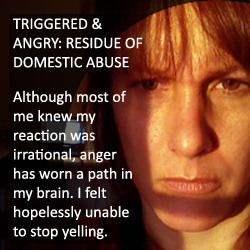 Recently, conversing with my fiance triggered an abusive and detrimental reaction from me. I threw up an emotional barrier, yelled violently, cried and became unwilling to continue talking at all. To say my behavior threw him off guard is an understatement. Jarimie looked at me in confusion and did not yell. Suddenly I realized I was the one behaving irrationally, and that realization caused me to stop yelling.
Recently, conversing with my fiance triggered an abusive and detrimental reaction from me. I threw up an emotional barrier, yelled violently, cried and became unwilling to continue talking at all. To say my behavior threw him off guard is an understatement. Jarimie looked at me in confusion and did not yell. Suddenly I realized I was the one behaving irrationally, and that realization caused me to stop yelling.
In contrast, my ex-abuser would have reacted to me by raising his voice further. In the early days with my ex-husband, I yelled at him thinking he would hear me and feel forced to recognize I was a part of the conversation. Later in the marriage, I yelled because I didn’t know what else to do with my anger. For me, yelling became a part of being angry.
I did not recognize my yelling as a symptom of a trigger right away. I felt justified in raising my voice simply because something made me angry. But then I saw Jarimie’s reaction – bewildered and questioning, not angry and hollering. His reaction was a sign for me to slow down and think about why I felt angry all of a sudden.
To be honest, I did not stop yelling immediately. My emotional wall was firmly in place and the process of the reaction gained momentum by the second. Although most of me knew my reaction was irrational, my reaction to feeling anger has worn a path in my brain. I felt hopelessly unable to stop yelling until Jarimie left the room. I took some minutes to collect myself.
I couldn’t remember what made me so angry at first. I allowed myself to cry in frustration and cycle through feeling of my behavior as justified (so I wouldn’t look like such a raving lunatic and continue to prove myself right when I was not). After I came to my right mind again, I considered the events leading up to my reaction. Jarimie and I were conversing about our future together and Jarimie was joyfully sharing his idea of our future when I suddenly erupted.
What Triggered Me?
I couldn’t name a phrase or an action or a tone of voice that set me off. Instead, it was the topic of the conversation itself. You see, I once spent many hours listening to my ex-husband talk about our future. He would listen to my ideas for the future so he could shut them down.
The conversation with Jarimie came to the point where it was my turn to share. However, my past experiences overshadowed the present and I felt diminished and my ideas discounted. I subconsciously felt that sharing my ideas would result in Jarimie shutting me down as Will used to do. So, instead of sharing, I felt the anger that revolves around feeling discounted and jumped straight to yelling.
Wow. I have to remind myself that jumping straight to an inappropriate reaction defines being triggered! I suspect that more than once the diminished/angry feeling silently infiltrated a conversation. I wonder how often that trigger affected me before now? Whose feelings did I hurt? How many of my righteously angry feelings were not righteous after all?
Triggered to Learn Better Coping Skills
I learned something new that will help me in the future: identifying my triggers will help me to heal from the abuse in my past. The more triggers I uncover, the greater the opportunity to learn better and healthier coping skills. This triggered event reveals that I do need to learn anger management skills. If feeling diminished is going to trigger yelling, and if yelling is a sign of anger, then anger management seems like a valid place to start.
It is okay for me to feel angry! Anger is important. However, I want to learn to enlarge the space between the feeling of anger and my reaction of yelling. In that calm space, I can discern whether I’ve been triggered or if I am angry for a valid reason. No matter where the anger came from, yelling isn’t going to help solve the problem.
I share How To Handle Trauma Triggers Caused by Domestic Abuse at HealthyPlace.com
My Temper Tantrum and How I’ll Handle Anger in the Future
‘You Hate Men!’ Is Diversion . . . and Retraumatization
Nothing on My Mind – Memories of Abuse
